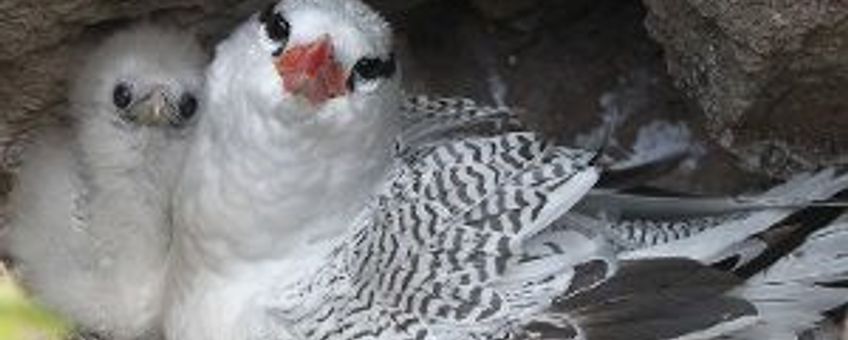
Bewijs geleverd voor ratten als eidieven op St. Eustatius
Bericht uitgegeven door Dutch Caribbean Nature Alliance (DCNA) [land] op [publicatiedatum]
Na uitvoerig onderzoek gedurende meerdere broedseizoenen aan de broedkolonies van de Roodsnavelkeerkringvogels op Saba en St. Eustatius, worden de bedreigingen voor het broedsucces van deze vogels steeds duidelijker. Het lijkt erop dat het besluit om een aantal verwilderde katten van het eiland te verwijderen een positief effect heeft gehad op het broedsucces van een onderzochte broedkolonie. Op het nabijgelegen St. Eustatius werd al langer vermoed dat ook de aanwezige ratten mede verantwoordelijk zijn voor het lage broedsucces. Recentelijk is daar nu het bewijs voor geleverd. Hierdoor is het mogelijk dat aanvullende beheermaatregelen getroffen dienen te worden, die kunnen verschillen tussen beide eilanden.
Lees verder in het Engels…
After a few seasons of research on the population biology and nesting success of Red-billed Tropicbirds on Saba and St. Eustatius, important information on the threats to their breeding success is starting to become clearer. Urgent actions to remove some predatory feral cats on Saba appear to be benefiting nesting success at an adjacent colony. However, on St. Eustatius, long-suspected predation by rats has recently been confirmed, and suggests that a range of additional conservation measures will be required to benefit Red-billed Tropicbirds, and this may vary between Saba and St. Eustatius.

Red-billed Tropicbirds only lay one egg and thus any egg or chick loss will typically result in failed breeding for that year. Some birds may lay a second egg, but these are usually unsuccessful. Nest failure may be due to numerous causes, including one of the pair dying or changing nesting partner, rock falls or collapsed burrows, insufficient food, immature or inexperienced birds, and nest predation by rats, cats, crabs and even goats. Studies elsewhere on other seabird species have shown that controlling one predator may result in an increase in other predators. For example, when cats were removed, this led to increased numbers of rats. However, the findings were mixed, and in some studies, controlling cats did result in an increase in rats, but in other studies, there was no increase in rats. Cats are clearly a significant predator of tropicbirds, at least at some colonies, on Saba, but we do not fully understand the complex relationship between tropicbirds, cats, rats and other predators.
An analysis of last year's camera trap data shows that cats primarily prey on Red-billed Tropicbird chicks. However, the additional new evidence suggests that rats tend to prefer tropicbird eggs. Progress has been made, but further research into the island-specific predator-prey relationships between these three (and other) species will have to continue in order to come up with an appropriate and effective conservation plan to ensure the survival and sustainability of these magnificent birds.
Lees het hele artikel in BioNews
Tekst: Dutch Caribbean Nature Alliance (DCNA)
Foto: STENAPA
Gepubliceerd door: Dutch Caribbean Nature Alliance (DCNA)
Nederlandse inleiding: Paul Westerbeek (Dutch Caribbean Nature Alliance)
